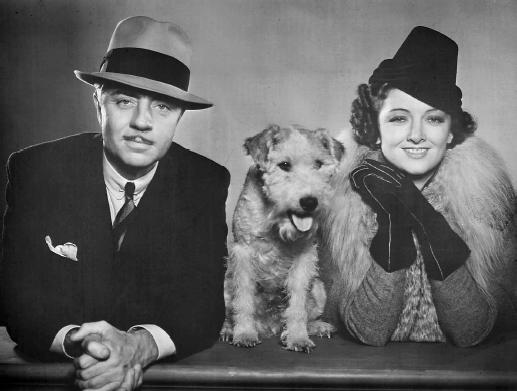
Mr. Strick's next review will be of A Brief Encounter, a humorless and draining depiction of marriage as "the longest journey" (Shelley)-- in utter contrast to the delightful and frivolous marriage which stands at the center of The Thin Man. The Wikipedia entry for the film series (six in all) describes the couple, Nick and Nora, as "a hard-drinking and flirtatious married couple who banter wittily as they solve crimes with ease." Yes! That is all true.
Although, boiled down to plot elements, the film contains murder, blackmail, bigamy, embezzling, and the like, the main characters are so unfazed by everything that one begins to feel it would be very naive to even care about the crime committed, whose solution is the ostensible motor power of the plot. Let me illustrate this point: in a mystery film, such as Murder on the Orient Express, every effort is made to play up the contrast between the apparent nonsense of Poirot's method, and the stunning results he produces. In the Thin Man, the mystery itself turns out indeed not to have been attended to any more by the screenwriters than by ourselves. All the pleasure, as it were, is to be had along the way.
Dashiell Hammett has earned a reputation somewhere below James M. Cain and Raymond Chandler for American noir novelists, and this is as it should be. The Thin Man skates over the thinnest premise entirely on charm: nearly every minor character over-stays their welcome, explanations and motives are rarely coherent, and the conclusion is absurd and unsatisfying. But we all know what charm is, no? And not only do Nick and Nora Charles (and their dog Astor) have it, but they are married. Married. I can not think of another film that makes being married look this great. Love stories all either lead up to a wedding, with married life never shown, or they deal in adultery. A good marriage is, for most purposes, not a cause of narrative.
This, of course, is true for our happy couple here. They never quarrel, but rather flirt. Nick is retired and they have no money concerns. Left to their own devices, their parties would *not* be invaded by reporters and suspects. The real genius of putting a delightful married couple at the center of a tumultuous murder investigation is precisely how little their marriage "needs" something like this to hold it together. One reason that I imagine the sequels are probably quite good is that there would be no reason to recreate the circumstances of the original's mystery. Like the Marx Brothers films, there is strictly speaking no need to limit these characters to a certain genre. I would follow Nick and Nora anywhere. They owe me nothing.
No comments:
Post a Comment